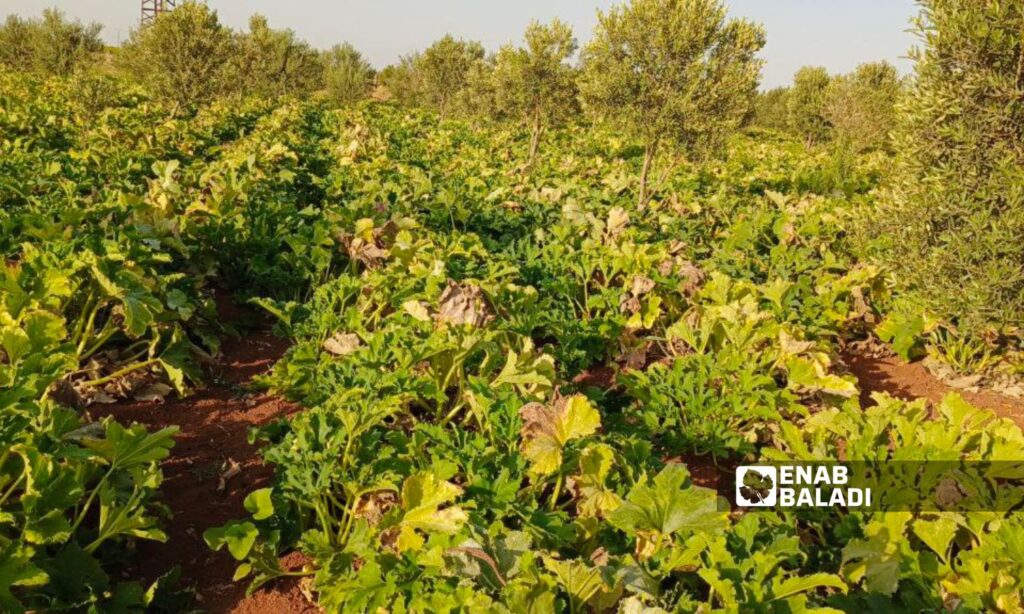Daraa – Halim Muhammad
Some summer crops in the rural areas of Daraa have been damaged owing to rising temperatures since early June, causing financial losses to farmers.
Crops such as watermelon, tomatoes, cucumbers, and zucchini were the most affected, according to interviews conducted by Enab Baladi with several farmers.
Farmer Loay al-Hariri lost approximately 250 dunums of watermelon produce, as the heat caused the drying of the vegetative mass (the green part above the soil) and exposed the fruits to sun damage.
Al-Hariri fears a similar loss for his tomato crops if the high temperatures and irrigation water shortages continue, which could lead to the crop damage amid the weak energy sources providing water.
The heat wave also affected the cucumber crop of farmer Mohammad al-Khalid (30 years old) in western rural Daraa. He reported that his crop, estimated at 20 dunums, was damaged after the heat wave, which came earlier than usual this season. Typically, it would occur in July each year, but this season it coincided with the beginning of fruit maturity, causing damage to the crops and incurring financial losses to the farmers.
Agricultural engineer Khalid Suleiman stated that the heat wave negatively affects all crops, including plants and trees. Heat stress causes physiological changes that affect plant growth and photosynthesis, leading to plant death.
Symptoms that appear on plants include yellowing and wilting of the leaves, or the color changing from green to brown or black.
Suleiman added that high temperatures might affect the flowering stage, resulting in poor fruit setting, which impacts productivity.
For prevention, the engineer advised irrigating at night or in the morning, avoiding irrigation during peak heat hours, and spraying crops with amino acids, potassium sulfate, and trace elements as a zinc sulfate solution.
Water shortage
Farmer Loay al-Hariri explained that high temperatures are not the only reason for the damage to his crop. The Electricity Directorate imposed a strict rationing schedule on agricultural transformers in eastern rural Daraa, operating for half an hour followed by six hours of power cut, preventing farmers from irrigating their crops.
He added that their subscription with the Directorate is an agricultural one, exempt from rationing for six hours of operation daily. However, with the rising temperatures, the Directorate imposed new rationing in early June.
Farmers in eastern and western rural Daraa benefit from subscriptions to electrical transformers that provide operating hours different from residential rationing, in return for paying monthly fees that could reach up to five million Syrian pounds.
Regarding solar energy, al-Hariri mentioned it has become costly, especially as wells in eastern rural areas are more than 300 meters deep, requiring a larger number of solar panels whose cost amounts to tens of millions.
An energy engineer residing in eastern rural Daraa stated that the performance of solar energy weakens in peak heat, adding that heat adversely affects the voltage of solar panels. The higher the temperature, the lower the voltage, weakening the panels’ ability to operate the motor.
For operating diesel engines, pumps require engines that consume eight liters of diesel per hour, with the price of a liter reaching 18,000 Syrian pounds, approximately 150,000 Syrian pounds per hour.
Daraa governorate is a major producer of vegetables, particularly tomatoes, cucumbers, watermelons, eggplants, and others. The production is exported to the capital, Damascus, and neighboring countries.
The Daraa Agriculture Directorate allocated 2,355 hectares for summer crop farming for the current season.
According to a statement from the Director of Daraa Agriculture, Bassam al-Hashish, to the Russian Sputnik agency in September 2023, the province’s production of tomatoes reached 400,000 tons.
The Daraa Agriculture Directorate estimated the province’s cucumber production for this season at 10,000 tons.

